
Free Culture: How Big Media Uses Technology and the Law to Lock Down Culture and Control Creativity is a 2004 book by law professor Lawrence Lessig that was released on the Internet under the Creative Commons Attribution/Non-commercial license on March 25, 2004.
MTV News: Unfiltered is an American television series created by Steven Rosenbaum which aired on MTV in the 1990s. The half-hour show features footage of real events provided by viewers, and later selected and edited by the show's producers. The videos show controversial events in the viewers' community that were not being covered by traditional news outlets.

Thunderpuss is the remix/production team of Los Angeles–based music producers Barry Harris and Chris Cox. Harris had previously worked as part of several music groups including Kon Kan, Top Kat, Killer Bunnies and Outta Control and had also released several solo singles himself. Cox, a musician and DJ, had also worked for years as a DJ and producer, producing a megamix of Paula Abdul songs, among other things, and started his own record label, Interhit Records, with Jeff Johnson.
Scott Williams is an American comic book artist, best known for his work as an inker, and for his decades-long partnership with artist Jim Lee, both of whom began Homage Studios, collaborating on books including The Uncanny X-Men, WildCATs, Batman, Superman, WildC.A.T.s/X-Men, All-Star Batman and Robin, and Justice League. Williams has also inked the pencils of Whilce Portacio and Marc Silvestri, and books including Gen13.
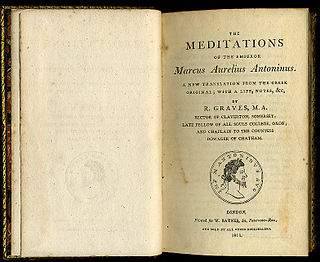
Meditations is a series of personal writings by Marcus Aurelius, Roman Emperor from AD 161 to 180, recording his private notes to himself and ideas on Stoic philosophy.
Sophie Luise Elisabeth Muller is a British music video director who has directed over 300 music videos. She won a Grammy Award for Annie Lennox's 1992 Diva video album, and an MTV Video Music Award for Lennox's song "Why" from the same album. In 1993, she received a BRIT Award for "Stay" by Shakespears Sister. She won another MTV Award in 1997 for "Don't Speak" by No Doubt. Muller is a longtime collaborator of Sade, Annie Lennox, Gwen Stefani, Kylie Minogue, Sophie Ellis-Bextor, Garbage and Shakespears Sister.
Show, don't tell is a narrative technique used in various kinds of texts to allow the reader to experience the story through actions, words, subtext, thoughts, senses, and feelings rather than through the author's exposition, summarization, and description. It avoids adjectives describing the author's analysis and instead describes the scene in such a way that readers can draw their own conclusions. The technique applies equally to nonfiction and all forms of fiction, literature including haiku and Imagist poetry in particular, speech, movie making, and playwriting.
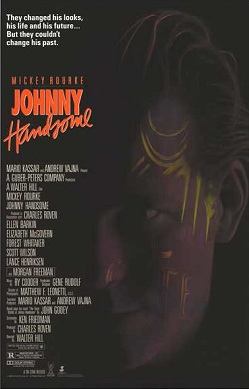
Johnny Handsome is a 1989 American neo-noir crime thriller film directed by Walter Hill and starring Mickey Rourke, Ellen Barkin, Forest Whitaker and Morgan Freeman. The film was written by Ken Friedman, and adapted from the novel The Three Worlds of Johnny Handsome by John Godey. The music for the film was written, produced and performed by Ry Cooder, with four songs by Jim Keltner.
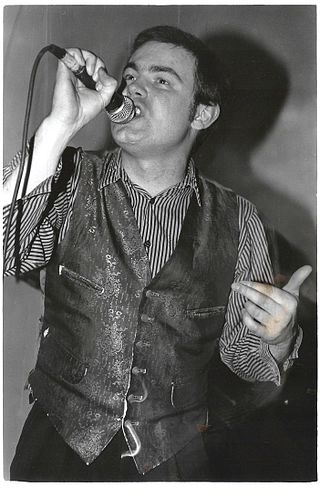
Moonshake were a British-based experimental rock/post-rock band, existing between 1991 and 1997. The only consistent member was singer/sampler player/occasional guitarist David Callahan, who initially co-led the project with Margaret Fiedler.
PAJAM is an American songwriting and production team, made up of Paul Allen, J. Moss and Walter Kearney, all of Detroit, Michigan. The team works with gospel, soul and R&B artists.

The Personal Heresy is a series of articles, three each by C. S. Lewis and E. M. W. Tillyard, first published on 27 April 1939 by Oxford University Press and later reprinted, also by Oxford University Press, in 1965. The book has been reprinted in 2008 by Concordia University Press with an Introduction by Lewis scholar Bruce L. Edwards and a new Preface by the editor, Joel D. Heck. The central issue of the essays is whether a piece of imaginative writing, particularly poetry, is primarily a reflection of the author's personality or is about something external to the author. The two positions may be summarized briefly as the subjective position (Tillyard) and the objective position (Lewis). In general, Lewis attempts to keep poetry within the reach of the common person, while Tillyard thinks of the poet as a person who is "a cut above the common person."
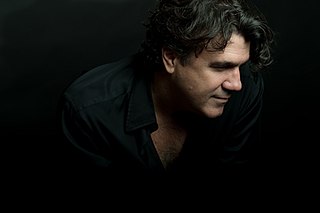
Darrell Brown is an American songwriter, arranger, manager and record producer who has collaborated with recording artists and contributed music to the film and television industries. Brown maintains residences in both Los Angeles, United States (US), and Nashville, US.
SaulPaul is an American artist and rapper from Houston, Texas. He has garnered much attention with his freestyles. SaulPaul's music has been considered unique, in comparison to mainstream rappers.
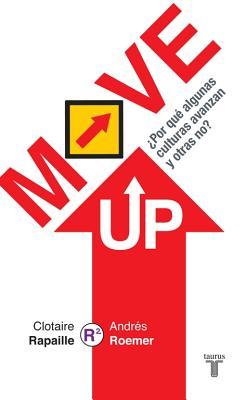
Move UP is a nonfiction book written by Dr. Clotaire Rapaille and Dr. Andrés Roemer in 2013 that explains upward social mobility from a biological and cultural perspective, and how societies and nations create adequate environments for maintaining the bio-logical requirements of the human species. The book is based on the latest research in biology, evolutionary psychology, behavioral economics, neuroscience and anthropology.

Austin Kleon is a New York Times bestselling author of five books: Steal Like an Artist; Show Your Work!; Keep Going; Steal Like An Artist Journal; and Newspaper Blackout.

The Obstacle Is the Way: The Timeless Art of Turning Trials into Triumph is the third book by author Ryan Holiday. It was published in 2014. It is a book which offers individuals a framework to flip obstacles into opportunities, an approach crafted by Holiday. It was inspired by the philosophy of stoicism.

Paranormality: Why we see what isn't there is a 2011 book about the paranormal by psychologist and magician Richard Wiseman. Wiseman argues that paranormal phenomena such as psychics, telepathy, ghosts, out-of-body experiences, prophesy and more do not exist, and explores why people continue to believe, and what that tells us about human behavior and the way the brain functions. Wiseman uses QR codes throughout the book, which link to YouTube videos as examples and as experiments the reader can participate in to further explain the phenomena. Because of a cautious American publishing market, it was only available in America through Kindle. Paranormality was awarded the Center for Inquiry's Robert P. Balles award for 2011.

Laurie Frick is a data artist who uses self-tracking information gathered from personal devices to create hand-built works and installations.












